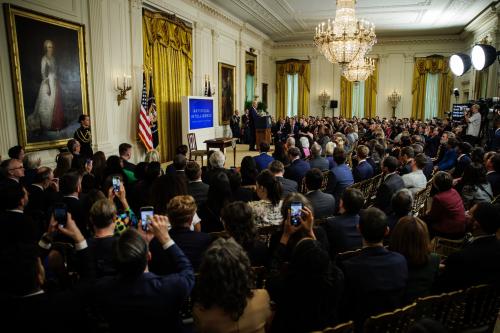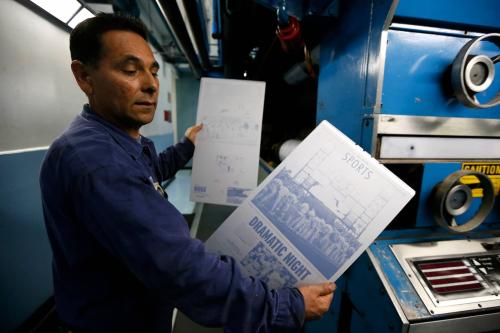Corporations have a long and varied history. Many of them were chartered and given special privileges in order to accomplish public purposes. This included things such as building roads, dams and canals. Even when companies were formed for private purposes, many corporate boards and management tended to focus on the long view of building great companies that would serve the long-term interests of shareholders and the nation.
Some observers, however, wonder if the current focus has shifted too much in favor of maximizing short-term shareholder profits. Many corporate leaders focus exclusively on quarterly profits and ignore broader constituencies such as employees, the community, and the nation and world as a whole.
To address this subject, we have launched a three-year project on the purpose of the corporation. As part of this effort, we will undertake research and hold quarterly forums on various aspects of corporate purpose. Our goal is to bring together leaders including lawmakers, corporate executives, university leaders, and representatives from the non-profit sector for discussions regarding the purpose of the corporation. Companies have special privileges and this raises several questions. What is the purpose of the firm? What benefits and obligations accrue to an enterprise as a result of incorporation? And what are the duties and responsibilities of corporate officers and directors?
In our opening forum on December 13, 2011, David Langstaff, the President and Chief Executive Officer for TASC, Inc., delivered a rousing keynote address where he argued that “business leaders need to step forth and be more actively engaged in finding the shared middle ground that we must find if we, together, are going to protect the Commons.” He worried whether our political and economic system could “pull ourselves out of our self-absorbed, myopic tailspin”.
Too many leaders, he complained, focus on short-termism and worry only about meeting the next quarterly financial target. Instead, he argued it is time for leaders to pursue a “virtuous cycle” whereby “business is granted a charter, given protection from liabilities in order to encourage it to take risks, offer employment, develop and distribute new offerings, and contribute to an improved quality of life and standard of living in society, for all its members.”
Langstaff’s speech was followed by an engaging conversation among three academic experts. Constance Bagley, the professor in the practice of law and management at Yale University, said many business schools have a tendency to focus on maximizing shareholder value and that we need a broader conception that includes shareholders, bondholders, and the community at large. She indicated we need better corporate disclosure rules so that companies disclose material circumstances that affect a variety of constituencies. Getting information out would help us deal with the “massive problem of externalities” that we currently face.
Tom Donaldson, the Mark Winkelman Professor at the Wharton School of the University of Pennsylvania, pointed to the Norway sovereign wealth fund as an example of financial investors who have a broader conception of corporate purpose that emphasizes societal values and socially responsible investment based on transparent principles. He argued that excessive systemic risk contributed to the global financial crisis and that it is “striking no one has gone to jail in the context of the financial crisis.”
Lynn Stout, the Paul Hastings Distinguished Professor of Corporate and Securities Law, said many law schools teach only about maximizing shareholder value and ignore broader conceptions of corporate purpose. She said this is driven by ideology coming from the University of Chicago and reflects a “mistaken view” of the law. She noted that congressional tax code changes have led companies to tie compensation to stock price performance and encouraged many business leaders to focus only on shareholders. She pointed out that we have a “hyperactive market” in which the average stock holding period is four months, compared to what was eight years during the 1960s.
The panel of experts was divided on what policy or legal changes were necessary to deal with current problems. Bagley argued that we need a “portfolio churn tax” to encourage longer-term stock holding. Among other proposals, she suggested that we need “patient capital” that does not churn stocks over short periods of time and that management should have incentives to hold stocks for at least six months so that investors don’t “act like day traders”.
In contrast, Donaldson argued there are “limits to what government can do” and regulations always are a “couple of steps behind innovation”. Stout said there was no silver bullet to deal with executive compensation issues, and that it was a mistake when the stock transfer tax was eliminated. She complained that many tax rules “favor Carl Icahn over diversified Moms and Pops.”



Commentary
Corporations Need a Broader Purpose
December 14, 2011